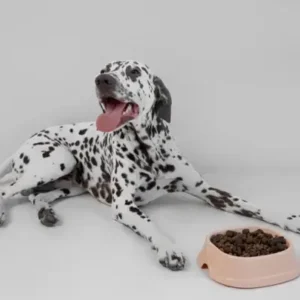Health Benefits of Peanuts for Dogs
Peanuts are packed with nutrients, making them a great source of protein, healthy fats, and essential vitamins for dogs, no matter their dog breed.
Here’s a breakdown of what peanuts offer:
- Protein: Peanuts are rich in protein, which is essential for your dog’s muscle growth and overall health.
- Healthy Fats: The healthy fats in peanuts can support your dog’s skin and coat, keeping it shiny and healthy.
- Vitamins: Peanuts provide vitamins like B6 and E, which are beneficial for your dog’s immune system, metabolism, and heart health.
That said, peanuts should only be given in moderation. While they have health benefits, they are also high in fat, which can lead to weight gain if overfed.
Potential Risks of Feeding Peanuts to Dogs
While peanuts can be beneficial, they come with some potential risks:
- Choking Hazard: Whole peanuts or peanuts with shells can be a choking risk, especially for smaller dogs. Always remove the shells and consider breaking the peanuts into smaller pieces.
- High-Fat Content: Peanuts are high in fat, which can contribute to obesity or even pancreatitis if fed too frequently. Be mindful of portion sizes, especially if your dog is already overweight or has a history of pancreatitis.
- Allergic Reactions: Some dogs may have peanut allergies, which can lead to symptoms like itching, swelling, or digestive upset. If you’re introducing peanuts to your dog for the first time, start with a small amount and observe for any signs of an allergic reaction.
How to Safely Feed Peanuts to Dogs
If you want to give your dog a peanut treat, follow these guidelines:
- Choose Unsalted and Unsweetened Peanuts: Salted or flavored peanuts can lead to health issues like high blood pressure or stomach problems. Always opt for plain peanuts with no added sugar, salt, or artificial flavors.
- Remove the Shells: Never feed your dog peanuts with shells, as they can cause choking or digestive issues.
- Serve in Moderation: Peanuts should be an occasional treat, not a regular part of your dog’s diet. Stick to small servings to avoid overfeeding and potential health concerns.
- Consider Peanut Butter Alternatives: If you’re concerned about the fat content of peanuts, look for peanut butter specifically made for dogs. Avoid peanut butter with xylitol, a sugar substitute that is toxic to dogs.
Signs of Peanut Allergies in Dogs
Although peanut allergies in dogs are rare, they can occur. Common signs of a peanut allergy in dogs include:
- Itching or skin irritation
- Swelling, especially around the face or paws
- Vomiting or diarrhea
- Difficulty breathing
If your dog shows any of these symptoms after eating peanuts, contact your veterinarian immediately. An allergic reaction can be serious and may require medical attention.
Other Peanut-Based Products: Should Dogs Eat Peanut Butter?
Peanuts and Peanut butter are popular products that many dog owners use to treat their pets. But can dogs eat peanut butter?
Yes, but with caution. As with peanuts, it’s important to choose peanut butter without added sugars, salt, or artificial sweeteners. Most importantly, avoid peanut butter with xylitol, as it is highly toxic to dogs. Stick to natural, unsweetened peanut butter in small quantities to safely treat your dog.
Peanuts can provide health benefits, such as protein and healthy fats, but their high fat content and potential for allergies mean that they should be an occasional treat. Always remove the shells, choose unsalted peanuts, and be aware of any allergic reactions.
Here’s a breakdown of which peanut varieties are safe for dogs to consume and which ones to avoid:
Can Dogs Eat Shelled Raw Peanuts?
Yes, dogs can eat shelled raw peanuts in small amounts, as long as they are plain and free from harmful additives. Avoid peanuts with aflatoxin by choosing high-quality, human-grade options.
Can Dogs Eat Boiled Peanuts?
No, it’s best to avoid boiled peanuts as they are often salted or seasoned, which can upset your dog’s stomach, and the shells pose a choking risk.
Can Dogs Eat Roasted Peanuts?
Yes, dogs can eat dry roasted peanuts in moderation if they are plain, unsalted, and unseasoned. Always ensure they don’t contain harmful additives.
Can Dogs Eat Peanuts and Cashews?
Yes, dogs can eat peanuts and cashews in moderation, as long as they are plain, unsalted, and unseasoned. Due to their high fat content, they should be an occasional treat to avoid weight gain or digestive issues. Always remove the shells before feeding them.
Other Dog-Safe Foods to Consider
If you’re looking to add variety to your dog’s treats, here are some other foods that dogs can eat in moderation:
- Cucumbers: Dogs can eat cucumbers as a crunchy, low-calorie, and hydrating snack, especially on hot days.
- Mangoes: Dogs can eat mangoes, which are rich in vitamins like A, B6, and C. Just ensure the pit and peel are removed before serving.
- Corn: Dogs can eat corn that is plain and cooked (off the cob). It’s a good source of fiber and energy. Avoid giving them the cob, as it can be a choking hazard.
- Tomatoes: Dogs can eat tomatoes ripe and red safely. However, unripe green tomatoes, stems, and leaves should be avoided, as they can be toxic.
As always, introduce new foods gradually, and serve them in small portions to prevent any adverse reactions.








